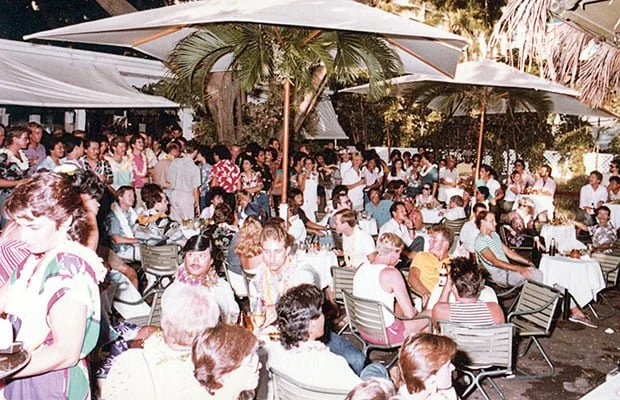
SENATOR DANIEL K. INOUYE
LGBTQ TRAILBLAZER
On September 2, 1986, U.S. Senator Daniel K. Inouye did something no other politician in Hawaiʻi had ever done before: he met publicly with his lesbian and gay constituents, listened to their concerns, and urged them to “stand up and be counted.”
It was a bold move to make at a time when most Americans considered homosexuality to be morally wrong, the Supreme Court had recently ruled that same-sex couples did not have a right to consensual sex, and gay men were being blamed for the AIDS crisis.
But Inouye had always been brave. A second generation Japanese American who witnessed the attack on Pearl Harbor, he volunteered for an all-Nisei combat unit in World War II and lost his arm to a grenade wound. As an elected representative to the Hawaiʻi Territorial Legislature, followed by the U.S. House of Representatives and Senate, he stood up for the civil rights and liberties of all people including Native Americans, Hawaiians, Alaskans, Micronesians and African Americans, disabled people, political dissenters, women, youth, and the elderly.
Inouye’s support for LGBTQ+ rights was equally deep and long-lasting, although not always as widely recognized. Some highlights include:
Co-sponsored a 1980 amendment to the Federal Civil Rights Act to include gay people, and subsequently, multiple versions of an Employment Non-Discrimination Act to prohibit discrimination in hiring and employment on the basis of sexual orientation and gender identity;
Was one of only 14 Senators to vote against the discriminatory Defense of Marriage Act in 1986 and among the earliest and most determined backers of marriage equality;
Supported the expansion of hate crime protections to specifically include sexual orientation and gender identity in 2009;
As a decorated army veteran, effectively advocated for the repeal of the Don’t Ask Don’t Tell policy in the military in 2011;
Supported the Uniting American Families Act, preventing anti-LGBT discrimination in immigration by allowing same-sex partners of permanent residents to obtain legal residence.
A MEETING AT HULA’S
Senator Inouye meet with the māhū & LGBTQ+ community at Hula’s Bar and Lei Stand, an iconic gay bar located under a large banyan tree in the Kuhio District, the heart of Waikiki’s thriving queer community. He was invited by the Hawaiʻi Democrats for Lesbian and Gay Rights, a new political advocacy group formed in response to the recent Supreme Court decision in Bowers v. Hardwick that state anti-sodomy laws were constitutional.
According to a newspaper account, approximately 75 people listened to Inouye in Hula’s courtyard, and more inside on the popular bar’s built-in video screens. “If you want to hide, that’s up to you,” said Inouye. “But if you want to stand up and be counted, I think there is greater hope for you.” Inouye also told the group that they had many supporters in the Congress, and that they would eventually triumph over “unreasoning prejudice.” He received a standing ovation
The original Hula’s Bar and Lei Stand was demolished in the 1990s and relocated to to its current location on Kapahulu Avenue in 1998, where the groundbreaking bar, and its pioneering owner, Jack Law, still thrive today. Hawaiʻi Democrats for Lesbian and Gay Rights morphed into the Stonewall Caucus of the Democratic Party of Hawaiʻi, an effective political and legislative policy organization. Senator Inouye passed away in 2012 and is remembered as an inspiring leader whose passion for civil rights and justice for all made him a trailblazer for LGBTQ equality.
Story by Dean Hamer, April 16, 2024. Mahalo nui to Jennifer Sabas, Senator Inouye’s former chief of staff and executive director of the Inouye Institute, for advice and guidance.
(Photographs of Hula’s entrance and patio courtesy of Jack law. Hula’s drink mug courtesy of DeSoto Brown collection.)





